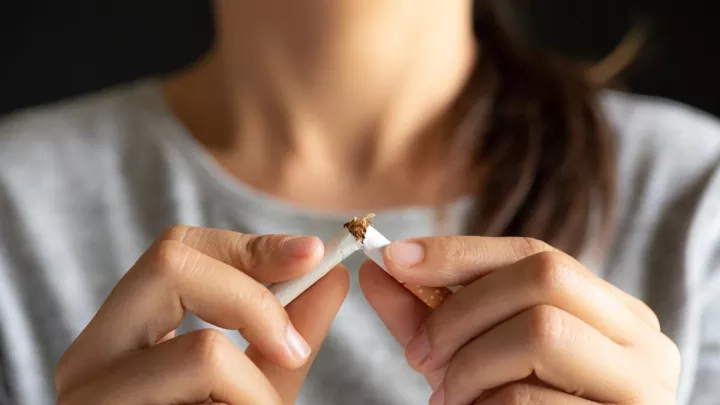Are nicotine pouches safer than chewing, smoking or vaping?

As e-cigarette use continues to be concerning among teens and adults, another type of flavored nicotine product is increasing in popularity – oral nicotine pouches and lozenges. This new category of "tobacco product" (without tobacco) is gaining particular traction in the youth market due to the wide array of youth-friendly flavors. Although advertising may make it look convenient and appealing, the fact remains that these products deliver varying amounts of the addictive chemical nicotine.
What are nicotine pouches?
Nicotine pouches are placed between the lip and gum. They do not contain tobacco but do contain nicotine, flavorings, sweeteners and plant-based fibers. You may have seen these products under the brand names of Zyn, On! and Velo in colorful packaging, many looking like mint containers.
Although nicotine levels vary significantly across the spectrum of types, the fact remains that nicotine use during adolescence has been shown to impact learning, attention span and proneness to addiction. Zyn products, in particular, can deliver as much as 6 milligrams of nicotine per pouch. According to a Nielsen data report, Zyn nicotine pouch dollar sales in convenience stores increased a whopping 470% in the first half of 2020.
Since research shows early age nicotine use and pleasurable initial experiences are linked to regular use and even lifetime nicotine dependence, we should be especially concerned about their use in adolescence.
Are nicotine pouches safer than chewing, smoking or vaping?
The long-term health impact of nicotine pouches is still unknown. Not technically categorized as smokeless tobacco, these products are not yet regulated as strictly by the Food and Drug Administration (FDA) as smokeless tobacco products or combustible tobacco are in the United States. Long-term data is yet to come, so we are unsure how reduced exposure may translate into reducing harm to our health. No current regulations exist that prevent or restrict flavored nicotine pouches and marketing restrictions are not as rigid as those on smokeless or combustible tobacco products.
Side effects of use can include irritation of the gums, sore mouth, hiccups, nausea and most importantly, nicotine addiction which increases relapse risk with other tobacco products.
Are nicotine pouches a safe approach to quitting nicotine dependence?
There is no data to show nicotine pouches as a safe or effective way to quit. "The FDA does not approve these products as tobacco cessation interventions or nicotine replacement medications, so I would not recommend them," says Kecia Christensen, APRN-NP, Nebraska Medicine certified tobacco treatment specialist. "If someone is already using nicotine pouches and has been able to quit tobacco, I would suggest weaning off them with the goal of nicotine freedom entirely."
Approved nicotine replacement therapies include nicotine patches, gum, lozenges, nasal spray and nicotine inhaler. "There is significant evidence suggesting that the most successful attempts to quit include both cognitive behavioral therapy and medications," explains Christensen. "All medications have side effects and indications for use, so it's important to discuss this information with your health care provider before use."
Living free of nicotine is possible - try these tips for quitting
If you're trying to quit, there is good news. You don't have to try and quit on your own. "Everyone I meet already has everything inside that they need to accomplish quitting," says Christensen. "Sometimes it just takes someone like me to help them explore their options, create a plan and remind them how strong they actually are."
Here are a few expert tips to help you quit for good:
- Understand nicotine withdrawal – what it looks and feels like for you
- Find ways to physically and mentally deal with urges in a healthy way
- Delay or distract to avoid tobacco use
- Practice mindfulness – don't be on autopilot, but be aware of every time you choose to use
- Use visualization, deep breathing or meditation to focus your energy
- Try a new hobby or activity to keep yourself busy
- Change routines
- Avoid access to tobacco – don't have it around, pay at the pump, avoid high-risk social situations)
- Exercise – it increases endorphins and helps you to stay busy in a healthy way
- Drink plenty of water
- Choose healthy foods
"My best advice is to pay attention to what you are saying to yourself," says Christensen. "We believe what we tell ourselves, so make sure you are saying the right things. You can do it and you will do it! What I want for my patients is for them to be their best self and I can confidently say that tobacco is not a part of that plan."
While the health effects are yet to be clearly known, nicotine pouches are still a source of an addictive substance that is not healthy. Are you struggling with nicotine or tobacco dependence? We're here to help. To get started, call 800.922.0000 and ask for a Tobacco Dependence Clinic appointment.







